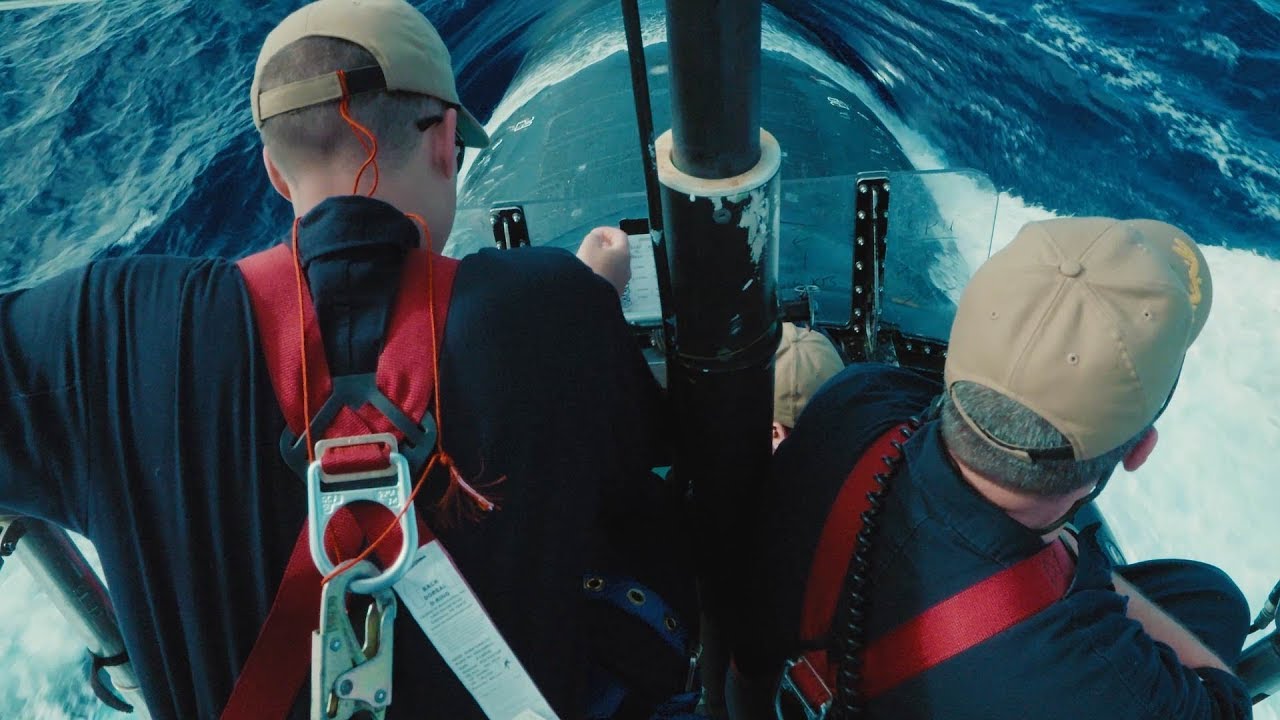What to Expect
More Information
Responsibilities
Submarine Officers are involved in all aspects of submarine operations from supervising the reactor plant to running the ship both in port and at sea. You could be in charge of any of the following:
- Operating a nuclear reactor, power generation and propulsion systems
- Maintaining onboard weapons systems
- Managing all life support systems
- Driving the ship and charting its position
- Operating sonar, radar, fire control, communications and specialized mission equipment
Work Environment
Submarine Officers are exposed to a variety of different work environments, from academic classroom settings, to training on prototype units, to sea tours and shore assignments. Deployments on Navy submarines last a few to several months and include conducting missions vital to national security. Learn more about life on a sub.
Training & Advancement
Upon graduation from college, the formal training process of becoming an officer in the Naval Nuclear Propulsion program is officially underway. For those going the Submarine Officer route, the first step is Officer Candidate School (OCS) in Newport, RI. OCS is a program that provides a comprehensive and intense introduction to the responsibilities of Navy Officers over the course of approximately three months.
Upon completion of OCS, newly commissioned Ensigns move on to receive the advanced training that is at the core of Navy Nuclear Propulsion, starting with Naval Nuclear Power School (NNPS) in Charleston, SC. This 24-week graduate-level course of intensive study covers a variety of science and technology-based subjects from calculus, to thermodynamics to electrical engineering to reactor dynamics. NNPS provides the foundational knowledge necessary for a theoretical understanding of nuclear propulsion.
From there, Submarine Officers attend Nuclear Power Training Unit (NPTU), often referred to as Prototype, in either Charleston, SC, or Ballston Spa, NY. This 26-week course of instruction involves hands-on training with several operational reactor prototypes. Here, officers apply the concepts learned at Nuclear Power School – studying systems and components of a nuclear propulsion plant and working with all the associated systems of a full-scale operating plant. The training culminates with qualification as Engineering Officer of the Watch.
Next comes the Submarine Officer Basic Course (SOBC), a 12-week course of instruction located in Groton, CT. There, officers learn all about submarine operations, including safety, damage control, seamanship and sonar systems along with the responsibilities of leading an advanced submarine crew as a division officer before reporting to an assigned submarine.
The roughly 15 months of shore-based training ends with an assignment as a Division Officer on a submarine, managing a team of highly trained Enlisted Submariners. Officers work toward a rigorous submarine qualification program that culminates in being designated as “Qualified in Submarines,” earning the right to wear the coveted Gold Dolphins insignia and take on all the responsibilities that go with it. Typically, this is a 32-month tour alternating between deployments, patrols, various ports of call around the world, as well as periods of time at home port conducting maintenance, training, local operations or taking leave.
After the Division Officer/Junior Officer sea tour comes a shore assignment lasting approximately two years. During this period, Officers fill positions anywhere from Nuclear Power School to Prototype to Submarine School. They may be selected to serve on high-level staffs or strategic projects, or further their education by taking advantage of the many graduate school opportunities the Navy has to offer. The ultimate goal for many is to one day command their own submarine.
In addition, Submarine Officers who choose to continue their time as a submariner can earn up to an additional $40,000/year as a Department Head.
As a Submarine Officer, you will also earn eventual qualification as Prospective Nuclear Engineering Officer (PNEO) – a Department of Energy certification recognized by the civilian nuclear power industry and an impressive item for your résumé following your time in the Navy.
Post-Service Opportunities
With a career as a Submarine Officer, you will have incredible post-service prospects. The highly-selective nature of the program combined with world-class advanced training and qualifications means your skills and knowledge are in high demand. Adding "Navy Nuke" to your list of accomplishments will make you a top candidate for a variety of future careers including civilian engineering and management jobs after you complete your service.
Education Opportunities
In addition to the best-in-class training and state-of-the-art facilities, current undergrad students who meet the prerequisite background will also get the chance to get paid while finishing school through the Nuclear Propulsion Officer Candidate (NUPOC) program. Students in majors like mathematics, engineering, physics and chemistry may receive preferred acceptance into the program.
If accepted into the NUPOC program as an aspiring Submarine Officer, you can:
- Receive a salary in excess of $4,000 per month for up to 30 months prior to your college graduation
- Receive an immediate one-time sign-on bonus of $15,000 plus an additional $2,000 bonus upon completion of nuclear propulsion training
- Enjoy military health-care benefits while you are a student in the program
- Have your college years enrolled in the program count towards retirement
- Be a full-time student with no military duties while in college
- Attain unparalleled leadership and managerial experience
- Gain outstanding operational and supervisory experience with nuclear, electrical, mechanical and instrumentation systems
Interested candidates should connect with a recruiter and ask about joining a related Q&A information session. This will help you learn more about what the job entails and get answers for any of your questions. These sessions are conducted weekly with no obligation to join the program in order to attend.
Postgraduate Education Opportunities
As a Submarine Officer, once you’re out of school you’ll have a position waiting as a respected professional and Officer affiliated with the most accomplished nuclear program on earth. Beyond undergraduate and formal Navy training and education, you can pursue additional graduate education by:
- Completing Joint Professional Military Education (JPME) at one of the various service colleges
- Using Tuition Assistance to attend online or in-person graduate programs during shore assignments.
- Navy College Program
- VOLED Assistance Center
- VOLED Region Advisors
- The Naval Postgraduate School (NPS)
- Navy War College (NWC)
- USAF Air University Air Command and Staff College
Qualifications & Requirements
Because of the demanding nature of Naval Nuclear Propulsion Program and the magnitude of the responsibilities members will take on from a young age, requirements to become a candidate and join NUPOC are stringent. The NUPOC program is open to both men and women.
To be an eligible candidate, you must:
- Be a U.S. citizen (dual citizens must renounce non-US citizenship)
- Be at least 19 years of age and less than 29 years of age at the time of commissioning—waivers up to 31 years of age for select jobs may be available
- Meet any additional physical standards of the Navy
Education
Candidates must be graduates or students of an accredited college or university in the United States or in a United States territory pursuing a BA, BS or MS (preferably major in mathematics, engineering, physics, chemistry or other technical areas). Those still in school may apply as early as 30 months from completion of an undergraduate degree for Submarine Officer positions. Applicants may also join the NUPOC program as early as 12 months from completion of a master's degree. Additional academic requirements include:
- Completed one academic year of calculus
- Completed one academic year of calculus-based physics
- A competitive GPA and a minimum grade of "C" in all technical courses
General qualifications may vary depending upon whether you’re currently serving, whether you’ve served before or whether you’ve never served before.
Part-Time Opportunities
There are no part-time jobs as a Navy Reserve Sailor in this role. Go back to Careers to find other jobs that have a Reserve component. You can also find out more about what life is like as a Reserve Sailor in the Navy.

































































































































